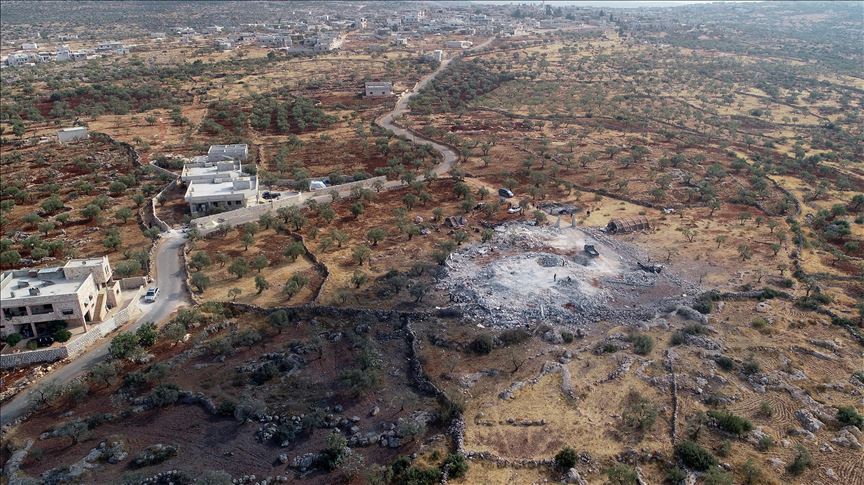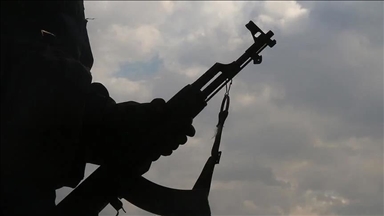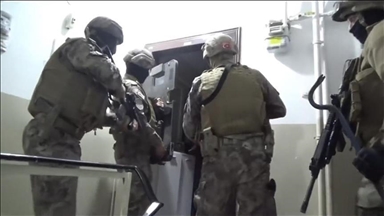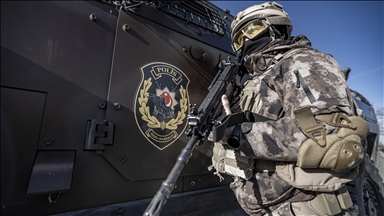Dilemma of Daesh: Caliphate claim persists after Baghdadi’s death
Daesh/ISIS appears to crave caliphate despite lack of own land, experts say
 A drone photo shows an aerial view of operation area where Daesh leader Abu Bakr al-Baghdadi killed, northwestern Syria, Idlib. ( Ahmet Weys - Anadolu Agency )
A drone photo shows an aerial view of operation area where Daesh leader Abu Bakr al-Baghdadi killed, northwestern Syria, Idlib. ( Ahmet Weys - Anadolu Agency )
ANKARA
Daesh/ISIS will continue to propagate its ideological claim of a so-called worldwide caliphate after its leader's death and declaration of a new "caliph" last week, experts said.
The Daesh terrorist group, also known as ISIS, on Thursday confirmed the death of its leader Abu Bakr al-Baghdadi in an audio statement.
In the recording released on Telegram messaging app channels close to Daesh, Abu Hamza al-Qurayshi, the terror group's so-called new spokesman, confirmed the deaths of Baghdadi and Daesh spokesman Abu al-Hassan al-Muhajir.
"Baghdadi’s death is beyond any doubt a very serious crisis for the terrorist organization," Prof. Dr. Mehmet Ali Buyukkara, deputy dean of the Faculty of Islamic Sciences at Istanbul Sehir University, told Anadolu Agency.
Buyukkara said Baghdadi was a ringleader who expanded the scope of the organization from Iraq to Syria, seized Raqqa and Mosul -- two major cities in Syria and Iraq -- and later declared the formation of a so-called caliphate in the region.
Baghdadi managed the process of the arrival of migrants and fighters from almost all parts of the world in these regions and sought to establish a functioning state in the territories under his control, he stressed.
Buyukkara noted that Baghdadi spearheaded the formation of terrorist cells in Muslim and non-Muslim countries across the world.
"Baghdadi managed to subordinate different organizations in other regions to himself, including those which are affiliated to the Taliban," he highlighted.
Daesh set up local affiliates in other regions as it released heinous execution videos on the internet and carried out gruesome attacks that reached far beyond its main territorial bastion.
Daesh to maintain religious, ideological claims
The group named Abu Ibrahim al-Hashimi al-Qurayshi as its new leader and pledged allegiance to the new "emir", according to a statement distributed by Al-Furqan, the group's media wing.
Buyukkara said the "Hashimi" and "Qurayshi" titles show that Daesh intends to maintain its claim of a worldwide caliphate.
According to the common opinion in the Sunni school of Islam, Amir al-Mu'minin, or the commander of the believers, must be a descendant of the Quraysh tribe of the Prophet Muhammad, he said.
Buyukkara underlined that it is not completely clear for now who the new leader is exactly.
The U.S. has identifying information on the man who succeeded Baghdadi after he was killed by U.S. forces, President Donald Trump said Friday.
"ISIS has a new leader. We know exactly who he is!" Trump said on Twitter, using another name for the Daesh terrorist organization.
But very little information is publicly available on al-Qurayshi, and the name itself appears to be a kunya, or nom de guerre.
Lack of own land biggest predicament for Daesh
Buyukkara, however, added that Daesh was defending the legitimacy of its claim of a so-called caliphate against rival jihadist or Islamist organizations by claiming own land and statehood.
Now the terror group lacks both of them, he said, adding it has actually lost its legitimacy according to Islam's Sharia law.
Under these circumstances, local 'emirs', who head semi-autonomous groups in areas which Daesh refer to as its "wilayat" or "provinces", and other senior leaders may have some hesitations about the leadership of Abu Ibrahim al-Hashimi al-Qurayshi, according to Buyukkara.
"In the coming period, Daesh may have to deal with intra-organizational conflicts more than before," he said.
The name of the organization may also lead to debate and controversy among its members, Buyukkara said.
"There may be even those who propose to change the name of the organization -- the 'Islamic State of Iraq and the Levant' or 'ad-Dawlah al-Islamiyah' in Arabic," he added.
Buyukkara expects the center of the organization to be in Iraq and Syria in the new era as the fragile political situation continues in the region.
"The current sectarian antagonisms especially in Iraq are as strong as the time when Daesh emerged," he said.
The presence of a strong Taliban will prevent Daesh from rejuvenating itself in Afghanistan, he added.
Terror group's claims of 'Caliphate' and “State"
The most important element that makes Daesh different from al-Qaeda is its emphasis on the concepts of "Caliphate" and “State", said Prof. Hilmi Demir of TOBB University of Economics and Technology in Ankara, an expert on radicalization, Salafism, sectarian conflicts and Daesh.
Baghdadi, whose real name was Ibrahim Awwad Ibrahim al-Badri, announced the creation of the so-called caliphate in both Syria and Iraq while delivering a sermon at Mosul’s Great Mosque of al-Nuri on June 29, 2014.
During the sermon, he had declared his name as Abu Bakr al-Baghdadi al-Husseini al-Qurayshi.
"This was a reference to the Sunni political paradigm and the common view among Arabs that the caliph must be from Prophet Muhammad’s Quraysh tribe," Demir stressed.
Demir highlighted that the organization naming its new leader as Abu Ibrahim al-Hashimi al-Qurayshi shows that Daesh will continue its symbolism and ideological claims.
"The organization aims to consolidate its militants by appointing a new “Caliph” after Baghdadi’s death," he said.
Baghdadi had been a top target for both the Trump and Obama administrations and had a $25 million bounty on his head.
As the U.S.-led coalition took back territories once under the terror group's hold, Baghdadi increasingly stayed in the shadows, only rarely releasing audio messages to his followers.
Terror group's 'multi-headed' structure
The death of Baghdadi has a symbolic value for the terror group to a certain extent, Baris Caglar, an assistant professor at the Department of Political Science and International Relations in MEF University in Istanbul, told Anadolu Agency.
Underlining that Baghdadi was a leader who inspires his supporters and give them a sense of security, Caglar said that his death means the end of top figure for the cult group.
The group, however, has a “multi-headed” structure with regards to its sociological pattern, according to the academic.
Although Baghdadi’s death is a factor which leads uncertainty within the group and affects group members’ motivation negatively, the new leader has already been announced, he said.
The immediate announcement of new leader is as remarkable as the death of Baghdadi, Caglar claimed.
Daesh's ideology and its strategic importance distinguishes it from a classical terrorist organization, he said.
Underlining that the group is determined to continue its claim of caliphate, Caglar said though the group representing its ideology may change, it remains almost the same with regards to its essence, ideology, and aim.





